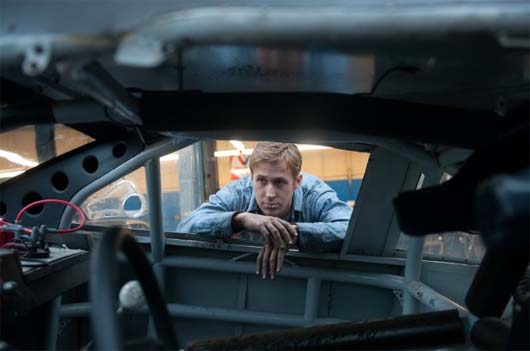 FILM
FILM In Which We Get This Show On The Road
 Friday, September 23, 2011 at 10:58AM
Friday, September 23, 2011 at 10:58AM 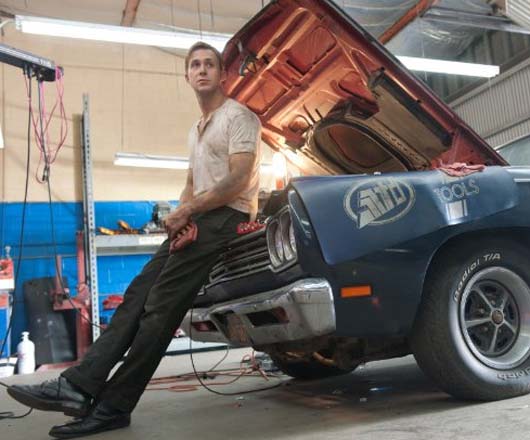
Drive Angry (3D)
by ELISABETH DONNELLY
Drive
dir. Nicholas Winding Refn
100 minutes
For the first ten minutes, Nicholas Winding Refn's Drive is a fantastic movie: tense and thrilling, with a meticulous, soft spoken getaway driver, The Driver, pushing his way through Los Angeles, gunning through lights, across bridges, pulling off hairpin turns to hide the car from the all-seeing helicopter eye in the sky, only to pull into a parking lot chocked with L.A. Clippers fans, the easiest place to disappear. Most importantly, what gives the sequence suspense is the diegetic cue of the Clippers game on the radio, fighting for airspace with the police CB. Those voices give Driver's driving purpose, and the audience can imagine that played out on Ryan Gosling's placid, smooth face.
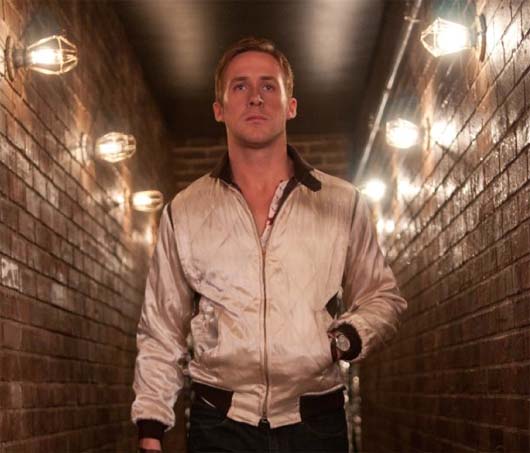
But after that scene, Driver keeps driving, and the neo-80s synth squalls and gurgles that pass for an updated Pretty in Pink soundtrack take over the film, and more importantly, swell with importance during any scene where Driver drives. Drive is a movie with air quotes around it, a European reimaginging of American noir with a John Hughes fixation and a hard-on for style over anything approaching empathy or character.
Watching it felt like watching a Paul Verhoeven film dedicated to making fun of America, with nothing pointed at the center, just an exercise in nothingness. Worst of all, Drive doesn't understand the art of driving, the necessary relationship that Americans have with their cars and the mythology of the open road.
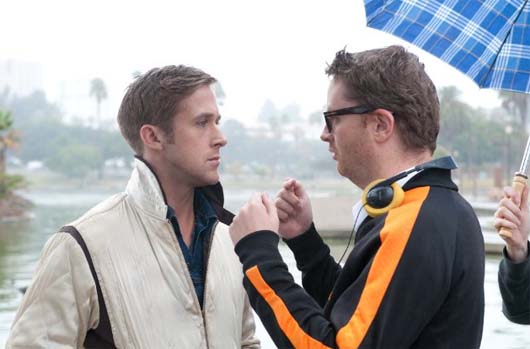
Driving is an art — it is an art of being completely zen, in the moment, and it's also one of those wonderful, private/public spaces where the world can see you, but you're safe. You can be yourself. Gosling's Driver is a man with no name, no discernible personality, and when he's asked what he does, he replies, "I drive." The scene goes on, with Gosling and his love interest, Carey Mulligan, just staring at each other like two adorable puppies.
But if a driver is defined by driving, then why doesn't he give away any feeling or emotion when he's behind the wheel? Why isn't he playing silly pop songs on the radio, occasionally singing along to Delilah's radio show while midwesterners and the elderly talk about the people they've lost? Because Drive is a boring film about driving, filming Los Angeles like it's a Miami Vice movie, barely daring to have any cool stunt driving scenes — after all, why have them, when you can have a scene with Ryan Gosling staring off into the distance in a way that may indicate meaning or existentialism? Refn films Los Angeles like he's making fun of it, like it's an ugly, squalid little hellhole of ironic signs and darkness.
The taciturn, nearly catatonic vibe of Gosling's Driver means that there's a big, empty hole at the middle of the film. Drive is assembled for maximum mystery and intrigue — who is this guy? Where does he come from? What does he want? But Gosling offers nothing, instead making the Driver another variation on his Lars and the Real Girl character, which made Drive feel like Lars and the Real Girl 2 most of the time. The blankness — not even a Mona Lisa smile of intrigue in there — is in stark relief to the weathered, character-filled face of Bryan Cranston, who fluttered around as the only real source of geniality and good cheer in this morose little film. (Walter White 4-eva!)
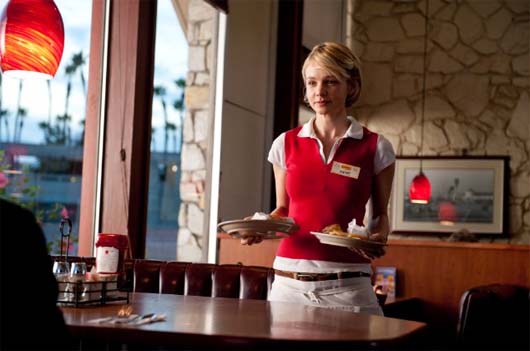
Between Gosling's obviously super-deep quiet man routine and the girlish Carey Mulligan sticking out like a sweet little squirrel in a role clearly meant for a woman with gravity and less of a milky English rose bellwether of good decorum and breeding (not for nothing is Gosling hooking up with Eva Mendes right now, an actress with womanly gravity), the romance, set to synth songs and googly-eyed glances, is nothing worth protecting.
So when the old ultraviolence comes into play, the film accelerates from boring to moderately bonkers — Driver has gotten in a pickle, you see, and Carey Mulligan may quite possibly die, so all sorts of crime and ketchup blood smears go off for the sake of a plot.
Most of the violence is cartoonish. Nothing feels like it matters, because there's no there there, no sense of inevitability, no thrust to what's happening. The villains loom (and Albert Brooks is the latest comedian to be overrated for being serious in a movie, clearly he's ripe for his Bill Murray role in a Wes Anderson-wannabe film), Christina Hendricks brings soulfulness and vulnerability to a role that's entirely too short, and more cool things happen because they look interesting.

Driver goes after Ron Perlman in his stunt driver face mask, creating an uncanny valley effect, Driver's sweet satin jacket with the scorpion on the back gets more and more blood stained and nobody seems to notice or care (the best joke in the film). And then there's that other borderline great scene — Driver kisses Mulligan's character in an elevator, the sort of kiss you write sonnets and poems about, a kiss where something's happening, and then he beats the shit out of the potential hitman in the elevator, crunching on his skull to the point of disgust. And Carey Mulligan just stands there. Perhaps, however, maybe all of this silence, this lack of Refn telling you, the audience what to think, is meaningful. It doesn't read as such — it's empty, goofy style, a total mess.
To its credit, however, it's an interesting mess, and not necessarily a disposable one. But really, if you're trying to make a movie that's entertaining, that has some guts to its structure, you don't have your hero use four of his twelve lines talking about "the scorpion and the frog" when there's a scorpion on his jacket. It's really on-the-nose and groanworthy, just like the closing song that calls the Driver "a real human being, and a real hero." Yes, it's sort of funny, but it's definitely in air quotes, and it has no interest in making the audience feel and marvel at anything. Just a passing giggle.
Elisabeth Donnelly is the senior contributor to This Recording. She tumbls here and twitters here. She last wrote in these pages about My So-Called Life.
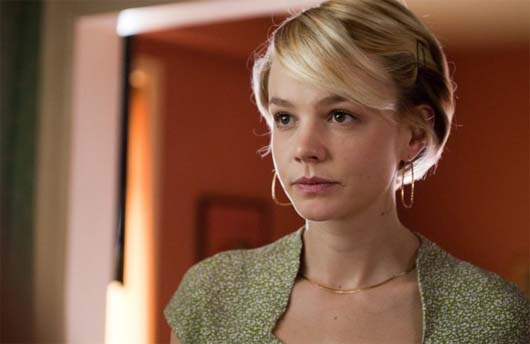
"Pretty in Pink" - The National (mp3)
"Bring On The Dancing Horses" - Echo & the Bunnymen (mp3)
"Please, Please, Please Let Me Get What I Want" - The Smiths (mp3)
